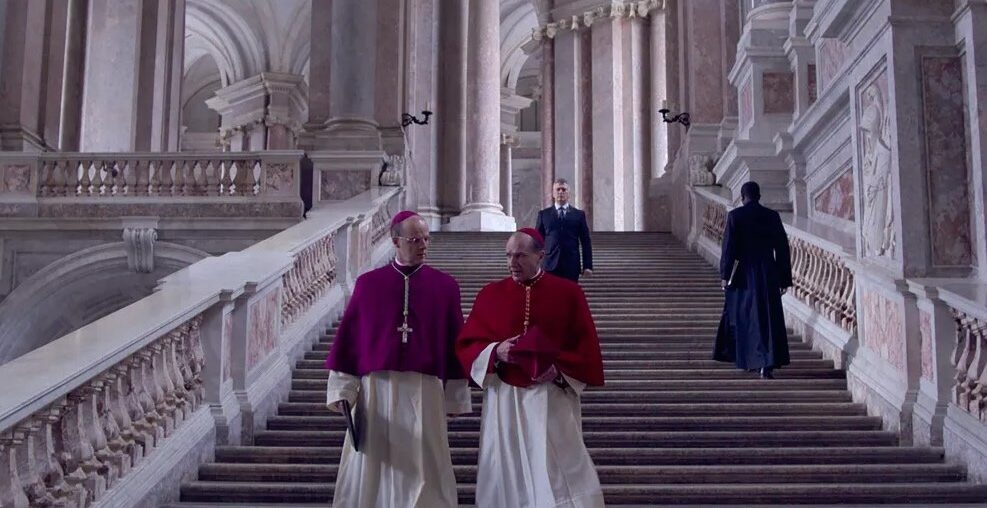
“Conclave,” it should be noted, is entirely fictional, though there are plenty of potential real-world connections. It should also be noted, for the unfamiliar, that the conclave process is closed off from the real world and largely secret. That perhaps solidifies its status as fiction, as everything that happens during a real conclave is unlikely to have been reported with complete accuracy — though the production team was given a walkthrough of the Vatican in support of an accurate portrayal.
That said, it makes for excellent fiction.
There’s a near-endless list of things to praise about this movie: knockout performances by leads Ralph Fiennes and Stanley Tucci as well as the ensemble cast, thoughtful and potent cinematography, an aptly urgent score. It’s nothing short of a phenomenal drama.
It’s a Catholic version of “Succession” — though of course the potential heirs aren’t blood related.
A particular highlight is the way the story humanizes these great, imposing figureheads of the Catholic Church and renders them undeniably human. It does so by exposing their flaws, yes, and through regular reminders of the great harms of the church, but it does so in small ways, too. The standout being a few intense moments of grief experienced by Lawrence, who considered the pope a close friend.
The intent of the characters is not just to humanize the unknown and powerful, but to represent the ideologies they’re canvassing for in the papacy. The characters, their beliefs and their disagreements are meant to set up a dichotomy between traditional and liberal theology.
The obvious connection to make here would be to claim that the arguments depicted are an allegory for the current political landscape leading up to the looming American election — and, in some ways, they are, in the sense that this movie’s release date is less than two weeks before Election Day and the issues presented essentially boil down to the same dichotomy.
Importantly, however, the original novel — from which the movie was faithfully adapted — was published in 2016 by a U.K. author and, more importantly, these issues are the ones dividing the Catholics today. Same-sex relationships, the involvement of women in leadership and the Latin Mass are a few issues that commandeer the docket.
If anything, the narrative is a look ahead at the future. The pope who’s recently died was more liberal and enacted a great deal of reform, as Pope Francis has done; the liberals of “Conclave,” therefore, are trying to retain and progress that reform, while the traditionals are trying to return to form.
All things considered, both sides behave with great certainty about their set of beliefs and their selected candidate. The movie perhaps reveals its hand by making the liberals protagonists and the primary traditionalist the antagonist, but there are plenty of shades of gray in between. In a hushed nighttime conversation, Lawrence and his compatriot Cardinal Aldo Bellini even admit that there’s no perfect choice for pope, and there never has been.
Half of the excitement of the movie, in fact, is watching popular papal candidates be knocked off their pedestals one by one.
Though nothing compares to the movie’s big reveal — that the pope was born intersex. It’s a shock, a controversy, an unprecedented reveal, but it’s not one without a purpose.
This is important, as it’s often the case that media that depicts Catholicism seems to do so just to push the envelope, or to make light of a religion that some believe takes itself too seriously. Often, these movies present controversy for the sake of controversy, a finger-in-the-face to Catholics who may disagree with the vulgarity or blasphemy of the movie’s message.
The “controversy” of Conclave isn’t taken lightly: it’s crucial to the movie’s message.
After all, the life of an intersex person is rife with uncertainty from birth. Cardinal Vincent Benitez, the papal successor, explains that the nature of his gender was an afterthought for most of his life, as he was raised a “modest” Catholic, but was all the more confusing when he realized he didn’t fit the norm.
He once had the opportunity to receive a hysterectomy, but chose ultimately not to go through with it — deciding instead to keep the body God gave him.
It throws things into a lurch, and it raises questions about the future that the movie largely leaves unanswered. When will the truth about Benitez come out, and how? How will other Catholic leaders respond? How will the church, the world at large, respond?
There’s uncertainty there — but in the world of “Conclave,” that’s possibly a first step on the path to true unity.

